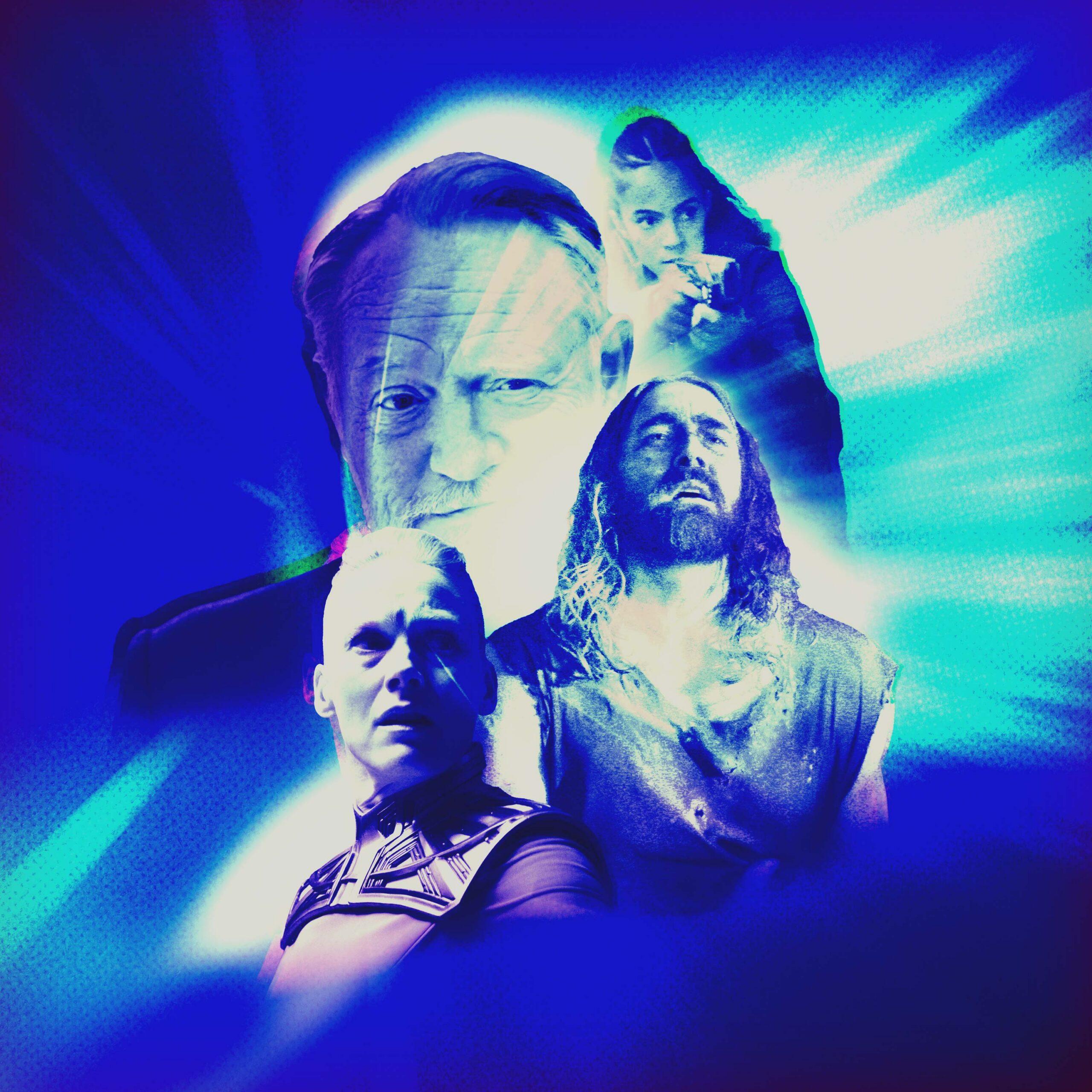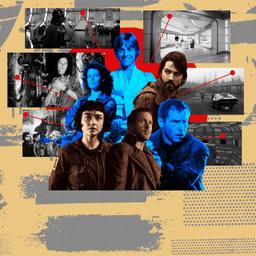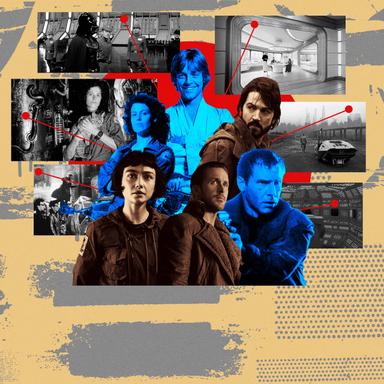‘Foundation’ Isn’t Homework—It’s a Deep, Fascinating Universe Worth Exploring
Apple TV+’s dense sci-fi series, which just concluded its third season, rewards attentive viewers and never forgets to entertain amid all the lore. But with shake-ups behind the scenes, what will the show’s next frontier look like?
When television leaves us overwhelmed with so many shows to pick from, it’s hard to recommend something that requires a painstaking level of commitment. If a series starts to resemble homework—as the Marvel Cinematic Universe did when it spread from cinema to streaming—you wouldn’t blame anyone for tapping out and settling for the goofy pleasures of, say, The Summer I Turned Pretty. (Team Conrad, obviously.) But the very best that the medium has to offer can make all those hours dedicated to a show’s elaborate plotting, shocking twists, and ever-shifting character motivations worth the investment. When I used to recap Succession for this site, my notes for a single episode could approach 10,000 words—and I loved every second of it. As long as it feels like your time is well spent, a complex series isn’t homework: It’s gratifying.
Which brings me to Foundation. Based on Isaac Asimov’s seminal book series of the same name, Foundation is among Apple TV+’s many science-fiction dramas (think: Severance and Silo) that established the streamer as the go-to platform for fans of the genre. But Foundation, which just wrapped up its third season, is truly unique among Apple’s sci-fi offerings. The show is intended to span a millennium, depicting the gradual descent of the Galactic Empire (no, not that one) while a gifted mathematician (prestige TV king Jared Harris) and his followers attempt to shorten the interstellar Dark Age that would follow it. As a result, Foundation effectively functions as a stealth anthology series, with each season involving a massive time jump that introduces new characters and conflicts—or “crises,” as Harris’s Hari Seldon puts it. The only mainstays are Seldon, who created a digital copy of his consciousness to oversee matters from a mysterious Vault; his protégé Gaal Dornick (Lou Llobell), who repeatedly enters cryosleep to endure over the millennia; the Galactic Empire’s tripartite Genetic Dynasty of clones, played by a combination of Cassian Bilton, Lee Pace, and Terrence Mann at different stages of their lives; and Demerzel (Laura Birn), a [cue the Transformers theme] robot in disguise programmed to serve (and preserve) the Empire at any cost.
It’s a lot to take in, so much so that I rewatch previous seasons in advance of a new one—a “here’s what you missed” recap video, even from Apple itself, is barely going to scratch the surface. I’ve probably spent more time analyzing the intricacies of Foundation than those of any other series; it can make Westeros seem like Medieval Times. Depending on whom you ask, these qualities are either an incentive to watch or a deterrent. But while Foundation won’t be for everyone, its richly detailed world-building, Shakespearean figures, and sumptuous production values have, in my estimation, turned it into television’s best-kept secret. And while Foundation does have a future beyond Season 3, budgetary disputes and a showrunner shake-up give the impression that the series may soon be dealing with a crisis of its own. My fellow sci-fi obsessives can only hope that its greatness will be preserved.
With Foundation concerned with nothing less than the fate of an entire galaxy, the series has already spanned more than 300 years. By the third season, Empire is shrinking, while the Foundation—Seldon’s movement from which the series gets its name—continues to grow. Both, however, are under threat from a new adversary known as the Mule (Pilou Asbæk), a space pirate with the ability to control other people’s minds—a mentalic, in this universe’s parlance—as evidenced by Season 3’s terrifying prologue, in which he coerces a planet’s armada to open fire on one another. Whether Empire and Foundation can set aside their differences to face a common enemy is one of the many plotlines Foundation has juggled this season, and considering how much ground the show has to cover, it would be easy for the characters to get lost in the shuffle amid these big-picture ideas. But one of the most rewarding elements of Foundation is seeing how its returning players evolve over the centuries—for better or worse.
If Foundation has an MVP, it’s the show’s Genetic Dynasty of emperor clones, who cleverly literalize the Galactic Empire’s stagnation. It would be one thing if the trio of Brother Dawn, Brother Day, and Brother Dusk were true carbon copies of one another, never deviating from what’s expected of them. But Season 1 revealed that the dynasty’s genetic code was corrupted by anti-imperial rebels, thereby running the risk that each successive ruler is a little off-kilter. Every Dawn we meet, for instance, seems disaffected by the responsibilities he’ll inherit and flirts with a life away from them—once going so far as to escape his home world with a lover. By Season 3, cognitive decline arrives much more quickly for Dusk, leading to a shorter shelf life before he’s ritualistically vaporized, either willingly or by force, courtesy of Demerzel.
As for Demerzel: Not since Westworld has an android persistently haunted my dreams like she has. She’s believed to be the only one of her kind, the last remaining link to an ancient war between robots and humans during which the latter, obviously, prevailed. Once a general, Demerzel has been forced into serving the Genetic Dynasty in perpetuity by the original emperor, Cleon I. In other words, behind all the Cleon clones, she’s the true ruler of the galaxy. That Demerzel wields all this power yet has no real agency of her own is hauntingly conveyed by Birn, whose eerie stillness is betrayed by the profound, aching sadness in her eyes. Even as she commits atrocities in the name of Empire—even when it requires her to kill the clones when they’re going off script—Demerzel remains Foundation’s most tragic figure. As Dusk tells her in Season 2: “None of us were free; we were fools to think we ever would be.”
The Foundation, meanwhile, has gone from quietly amassing power in the shadows to becoming a true peer of the Galactic Empire. (By Season 3, the Foundation has its own embassy on Empire’s home world of Trantor, which is like Star Wars’ Coruscant by way of Blade Runner.) Along the way, however, the Foundation has transformed from the galaxy’s savior against Empire into a flawed regime of its own. Present-day Foundation is run by a de facto oligarchy of thin-skinned bureaucrats, while Gaal, a mentalic herself, is so intent on defeating the Mule that she’s willing to put entire planets in harm’s way. There’s caring more about the greater good, and then there’s callousness; over time, the Foundation has leaned toward the latter.
It’s heady stuff, and I haven’t even addressed the robot-worshipping cults, rebellious merchant factions, religious movements, and cybernetically augmented beings that help make this universe feel so lived in. Sometimes I have to watch an episode two or three times to really take in all the information presented. There are callbacks to events in earlier seasons that completely change your perspective on the series. And therein lies the brilliance of Foundation: There are so many things worth savoring. You can acknowledge the modern parallels of a decadent, once-mighty empire falling apart before your very eyes. You can luxuriate in jaw-dropping, kaleidoscopic visuals that showrunner David S. Goyer explained are courtesy of a budget in which any two episodes of the series were “bigger than some of the movies I’ve done” (and this guy worked on The Dark Knight and Man of Steel). You can scream in your living room when there’s a shocking twist or a body horror moment that would make David Cronenberg proud. You can admire accomplished actors and newcomers alike giving some of the best performances of their careers. You can celebrate the fact that every season finds an excuse to remove Pace’s clothing.
It might not have the accessibility of something like Severance or Alien: Earth, but as far as sci-fi television goes, Foundation is as good as it gets. If you’re willing to put in the time—and appreciate how much the show respects the audience’s intelligence—Foundation rewards your efforts. And giving the series your undivided attention isn’t exactly the same as cramming for a physics test; time and again, Foundation has delivered moments that will leave your jaw on the floor. Pace’s Day will yell at an underling so aggressively that they have a heart attack on the spot; he will explain to a captive spy, in excruciating detail, how he’s tracked down every person their life has touched for the express purpose of eradicating them; he will stare, in stunned silence, as his robot mom–cum–lover calls him “a sperm led by its waving flagellum, mistaking its random motion for complexity.” This is why, House of the Dragon notwithstanding, Foundation feels like a worthy heir to Game of Thrones: The lore is dense and the shifty, high-stakes politicking can be dizzying, but the series never forgets that its guiding principle is to entertain.
Without giving too much away, Season 3 also throws a curveball into Foundation’s usual order of events: Rather than resolve the next crisis and set up another time jump, the finale leaves everything in a state of disarray. The Mule: not who they claimed to be. The Foundation: fucked. Empire: irreparably fucked. Demerzel: [sad robot noises]. It’s all building to a fourth season that, even for a show that has the fate of intergalactic civilizations baked into its DNA, has stakes that are higher than ever before. This could be the most anticipated season of a sci-fi series since the end of The Expanse (real ones know).
Unfortunately, the Foundation I’ve been breathlessly praising may be no more. As Bloomberg reported last year, Apple has decided to rein in spending for its streaming service, and Foundation was singled out as one of the shows that would have to make do with a smaller budget. This led to delays in the production of Season 3 before Goyer announced that he would be departing the series moving forward. The good news: Foundation has officially been renewed for a fourth season, with new co-showrunners Ian Goldberg and David Kob aiming to start production in early 2026. The bad news: Goldberg’s last stint as showrunner was on the later seasons of Fear the Walking Dead, which doesn’t exactly have a sterling reputation. Foundation fans have already sounded the alarm. (As have Dead-heads still bitter about what transpired in the spinoff.)
Viewed one way, it’s encouraging that Foundation will live to see another season; conversely, it’s hard not to worry that the show is facing the kind of crisis that Seldon himself couldn’t fix. In the meantime, I’ll remain cautiously optimistic that Goyer has laid enough groundwork that a new creative team can make a smooth transition into the next season. But even if the worst comes to fruition and the new creative team runs Season 4 into the ground, it doesn’t take away from the rich, absorbing experience that Foundation has already given us. That the series was created from source material once considered unadaptable is worth celebrating in and of itself; that Foundation has become the gold standard for sci-fi television is nothing short of a miracle. So for any self-professed sci-fi fanatic who has yet to give Foundation a whirl, what the hell are you waiting for? And for those who’ve enjoyed the series from the beginning, take solace in knowing that, unlike Seldon’s Vault, three magnificent seasons of Foundation will always be open to us.





